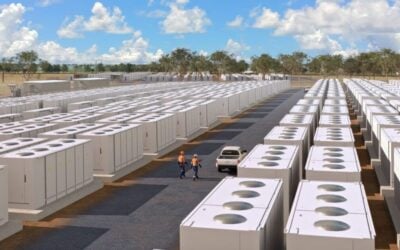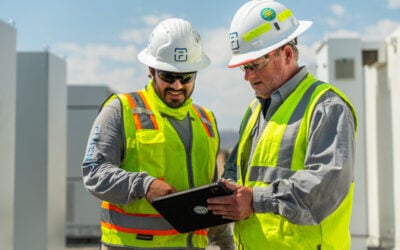
A real estate and infrastructure investment arm of BlackRock has committed to investing a billion Australian Dollars (US$700 million) into growing an Australian developer’s energy storage business.
BlackRock Real Assets manages US$60 billion of funds worldwide. The group announced today that one of the funds it manages has agreed to acquire Akaysha Energy, which develops energy storage and renewable energy projects.
Enjoy 12 months of exclusive analysis
- Regular insight and analysis of the industry’s biggest developments
- In-depth interviews with the industry’s leading figures
- Annual digital subscription to the PV Tech Power journal
- Discounts on Solar Media’s portfolio of events, in-person and virtual
Akaysha has nine projects in development that it wants to put into Australia’s National Electricity Market (NEM). BlackRock will commit the billion-dollar funding into that pipeline, which the company said totals 1GW of battery storage.
That gigawatt of storage could enable the addition of around four times as much new renewable energy capacity onto the grid through managing the variability of wind and solar PV, BlackRock claimed.
Australia is targeting 80% renewable energy by 2030 and various studies have shown a growing need for energy storage to enable its integration. In an interview with Energy-Storage.news earlier this year, Dr Bruce Mountain of the Victoria Energy Policy Centre (VEPC) explained the urgency of getting that storage online quickly.
Unlike Europe or the US, Australia doesn’t have a lot of gas-fired baseload electricity generation, although it does have a sizeable fleet of gas peaker plants. Nor does it have much hydroelectricity and it doesn’t have any nuclear power plants.
With most baseload generation coming from coal in Australia and no prospects of building new baseload gas plants, VRE combined with energy storage is the quickest, cheapest and most effective way to lower emissions, avoid exposure to fossil fuel price spikes and add secure and decentralised capacity, Mountain said.
The Australian Energy Market Operator (AEMO), which oversees and sets the rules for the NEM, has modelled that by 2050 that could mean 59GW of storage being required to integrate a projected 204GW of variable renewable energy (VRE) which will be on the system by that time.
In founding Akaysha Energy, the company’s managing director Nick Carter identified a gap in the market for a “a fully integrated development business focused primarily on battery storage,” particularly in light of the accelerating energy transition in Australia and the wider Asia-Pacific region.
A former employee of Tesla Energy and consultancy Macquarie, Carter has assembled a team of established energy sector professionals and partners with Tier One suppliers of equipment.
“The Asia-Pacific region is at the dawn of its energy transition from carbon emitting fossil fuels to intermittent renewable resources and we believe a successful shift to a more sustainable energy future is dependent on the use of large-scale battery storage,” Carter said today, adding that Akaysha will be able to leverage BlackRock’s “global capabilities and track record in climate infrastructure”.
The developer does everything from modelling and simulating optimal strategies for energy dispatch and market participation as it originates projects, to bringing projects online at greenfield sites and operating them on both a single asset and fleet basis.
It’s the latest investment into an energy storage development portfolio by a major investor, with recent moves made by the likes of sustainable infrastructure investor Generate Capital to acquire developer esVolta in the US and the Alberta Investment Management Corporation’s acquisition of a stake in UK developer Constantine Energy Storage (CES).
In Australia, most battery developments to date have been tied to generator-retailer (‘Gentailer’) utilities with balance sheets large enough to finance and accept the risk of participating in the country’s largely merchant opportunities for earning revenues from battery storage, mainly through frequency control ancillary services (FCAS) in the NEM wholesale market and smaller shares of income from arbitrage and other applications.
“As renewable energy infrastructure continues to mature in Australia, investment is required in battery storage assets to ensure the resilience and reliability of the grid, especially with the continued earlier-than-expected retirement of coal-fired power stations,” BlackRock’s co-head of climate infrastructure in the APAC region Charlie Reid said.
“For our clients, we see tremendous long-term growth potential in the development of advanced battery storage assets across Australia and in other Asia-Pacific markets and look forward to working with Akaysha to ensure an orderly transition to a cleaner and secure energy future.”






